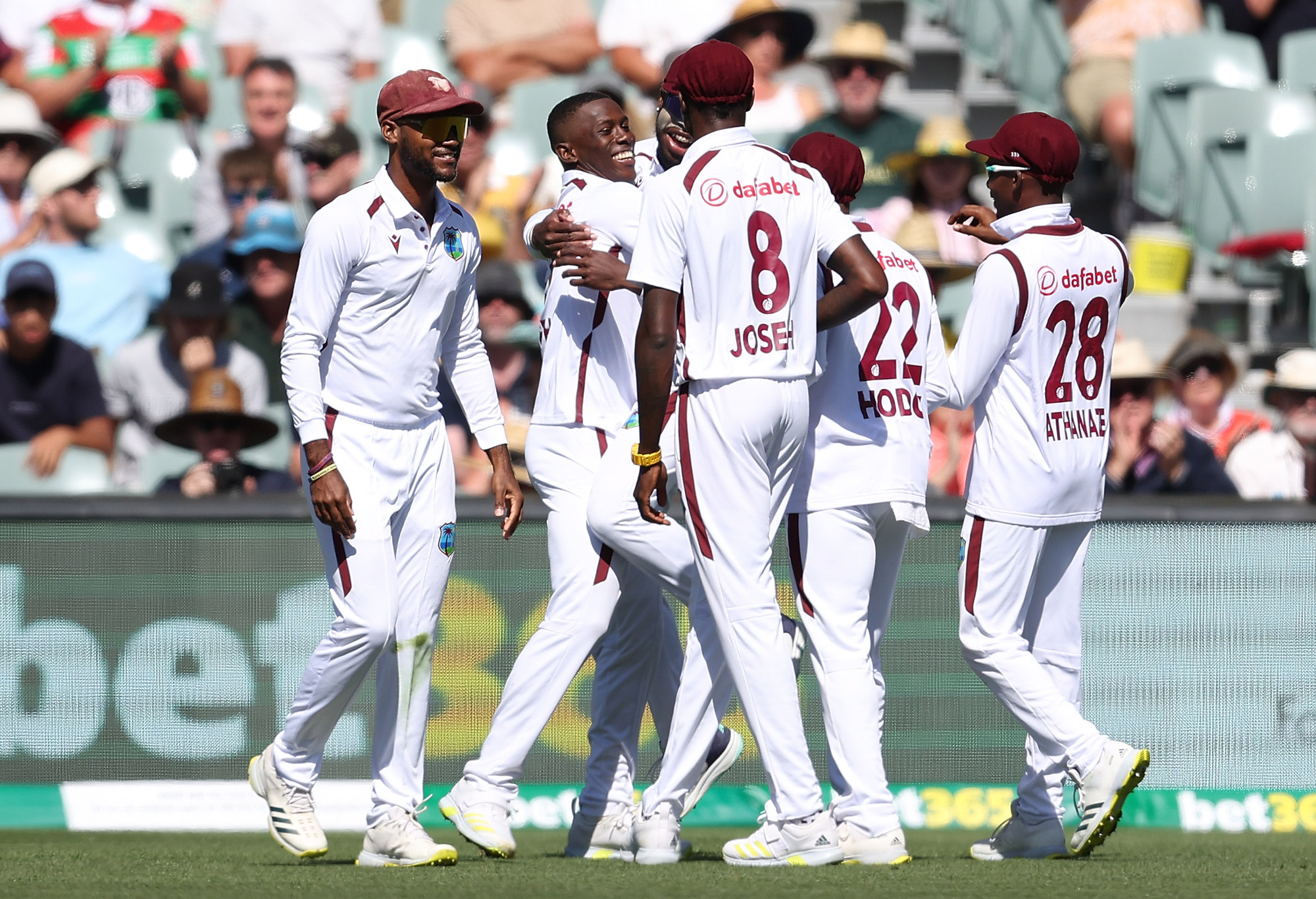COMMENT: What’s the point in playing the Windies? Only the future of Test cricket itself
Windies #Windies

The West Indies are probably not going to beat Australia at the Adelaide Oval.
They’re probably not going to get close.
For all the grit and skill of Kirk McKenzie with the bat, and the speed and raw enthusiasm of debutant Shamar Joseph with the ball, on Day 1 in the city of churches, the talent gap between the Windies and Australia, even after two and a half decades of near-universal one-sided contests between these two old foes, has rarely felt more stark.
Joseph’s wonderful first day as a Test cricketer, his two late scalps of Steve Smith and Marnus Labuschagne – the former with his very first ball – adding to his freewheeling 36 with the bat as No.11 to add 55 for the last wicket, has papered over the cracks, but in truth it would be an achievement for the calypso kings to force the hosts to so much as bat twice this Test.
Join the stars from rugby league, AFL, Test cricket, BBL and more at An Evening with Tom Brady.
Indeed, the running joke around the internet when Pat Cummins won the toss and chose to bowl first was that the Aussies were particularly keen on a weekend off – whether true or not, few teams have ever toured Australia where a home victory has seemed more certain.
So naturally, over the next fortnight, through which the rest of this Test and a second one at the Gabba will be played, you’ll probably encounter commentary about the point of it all.
Why are Australia wasting their time hosting a substandard opponent, with a shoestring XI devoid of many first-choice players for reasons both fitness and financial, in front of most likely patchy crowds, with the whole operation certain to run at a loss for the powers that be?
That was basically the sentiment delivered by South Australia Premier Peter Malinauskas in December, when he publicly hit out at CA for stitching his state up by foisting the Windies on them two summers in a row, with surely the most disrespectful comments delivered their way since Tony Greig’s infamous ‘make them grovel’ quote while England captain some 48 years ago.
“Cricket Australia really gave us a kick in the guts by giving us West Indies two years in a row, starting the Test on a Wednesday and prioritising Perth. Well, look how that turned out for them,” Malinauskas told The Advertiser back in December.
“The fact that we get West Indies two summers in a row is frankly disgraceful, particularly given the deliberate decision to schedule Australia versus Pakistan, in Perth straight up over and above Adelaide.
“Cricket Australia have reaped what they sowed by showing contempt to South Australian cricket attendees with the results of the crowd they got in Perth.”
Going 12 months further back, the otherwise excellent cricket commentator Adam White was widely lampooned for a post on X claiming the West Indies, after a humbling loss to Australia, were ‘wasting everyone’s time. Including their own time’.
There’s a problem with this line of thinking – and that problem will kill Test cricket dead if it’s allowed to permeate CA and the game itself.
For starters, this Australian team is rather good. Better teams than this West Indies batting order have been skittled on these shores by Pat Cummins, Josh Hazlewood, Mitchell Starc and Nathan Lyon – three years ago, an all-time Indian team mustered 36 all out at this very venue.
No one suggests England are unworthy of Tests against Australia despite having spent the last 11 years and three tours getting mercilessly pummelled from first ball to last every time they come out this way.
It’s in this respect that Australia have fallen behind England and even India when it comes to safeguarding the future of Test cricket.
For all their faults and missteps as the new key powerbrokers for the game, India have done more than any other nation in helping to improve Afghanistan as a cricketing nation – it was they who took them on in their inaugural Test as a full member nation, they who regularly play the one-time minnows in ODI and T20Is outside ICC events.
England do similarly with Ireland, having played their neighbours in two Tests in the last five years as warm-ups for the 2019 and 2023 Ashes series. Ireland even bowled their big brothers out for 85 on a memorable day at Lord’s in the first of those matches.
For all their pontificating about how Test cricket remains their pinnacle, and its preservation their highest priority, what have CA ever done to safeguard the longest format’s future?
Well, they’ve cancelled a Test against Afghanistan and claimed to be upholding the human rights of women affected by the Taliban in doing so (a moral stand that mysteriously melted away when it was time to play them for precious World Cup points at each of the last two tournaments); done similarly to Bangladesh to scupper both an overseas tour in 2015 and a planned home one in the winter months more recently; and claimed COVID made touring South Africa in early 2021 too great a threat mere months after happily travelling to England in a similarly perilous state.
All these decisions have consequences; you can’t complain as the cricketing world slowly turns to prioritising limited-overs cricket when you haven’t lifted a finger to make Test matches a viable alternative.
Even now, for all the doom and gloom, the future of the longest format is like climate change – urgent and radical change is needed as soon as possible to avoid catastrophe, but it’s not a lost cause just yet.
One only needed look at Joseph’s triumphant sprint into the Adelaide outfield after having Smith caught at slip off the first ball of his Test career to realise this.

Shamar Joseph celebrates after dismissing Steve Smith with his first ball in Test cricket. (Photo by Paul Kane/Getty Images)
A 24-year old from the tiny town of Baracara deep in the jungles of Guyana, his journey to the top level is one of the most remarkable you will hear.
That talent identification and the pathway system in the West Indies, for all the flaws with its governing structure and domestic competition, is still strong enough to get Joseph to the big time, and more broadly, that enough people in the region still care enough about long-form cricket to make it happen, warms the soul.
It may be too late for the Windies to become a Test powerhouse again, even with a significant and united financial effort from a united cricketing world to raise them up. The lure of T20 cricket, and the unmatched riches it provides, is too strong and too engrained.
Indeed, mixed with praise for Joseph’s remarkable debut, there are already jokes that within 12 months time he will be bought body and soul by one IPL franchise or another, never to play another Test series.
South Africa aren’t unsalvageable, for all the despair their third-string squad to tour New Zealand in coming weeks generated; their board has deemed the SAT20 competition their financial saviour having neared bankruptcy in recent years, but with a pooling of international resources, as unlikely as it is that India in particular would willingly give up a slice of its IPL pie to help a rival Test nation sustain itself, hope springs eternal.
But within five years, it will be too late. As it will when New Zealand – and yes, right now that is a when and not an if – go down a similar route; then Bangladesh and Sri Lanka, then perhaps Pakistan, until finally, the so-called ‘Big Three’ are the last custodians of cricket’s truest and oldest form.
And then it will truly be over; no sport can exist without an opposition – even the might of India requires an opponent, after all.
Cricket Australia could be doing more, much more, to uphold the format it claims to value above all others: both in helping reshape the ICC’s governance structure so that the needs of itself, England and India are matched or maybe even run secondary to the global health of the game, and in deigning to tour and be toured by nations unlikely to challenge for wins, but who will be enriched and improved by the opportunity to take on the best.
The least we could do is to support that venture; see the positives of McKenzie’s innings or Joseph’s scorching speed rather than the likely heavy loss that is to come for the visitors in Adelaide.
What’s the point in playing the Windies, you might ask? Only the future of Test cricket itself.